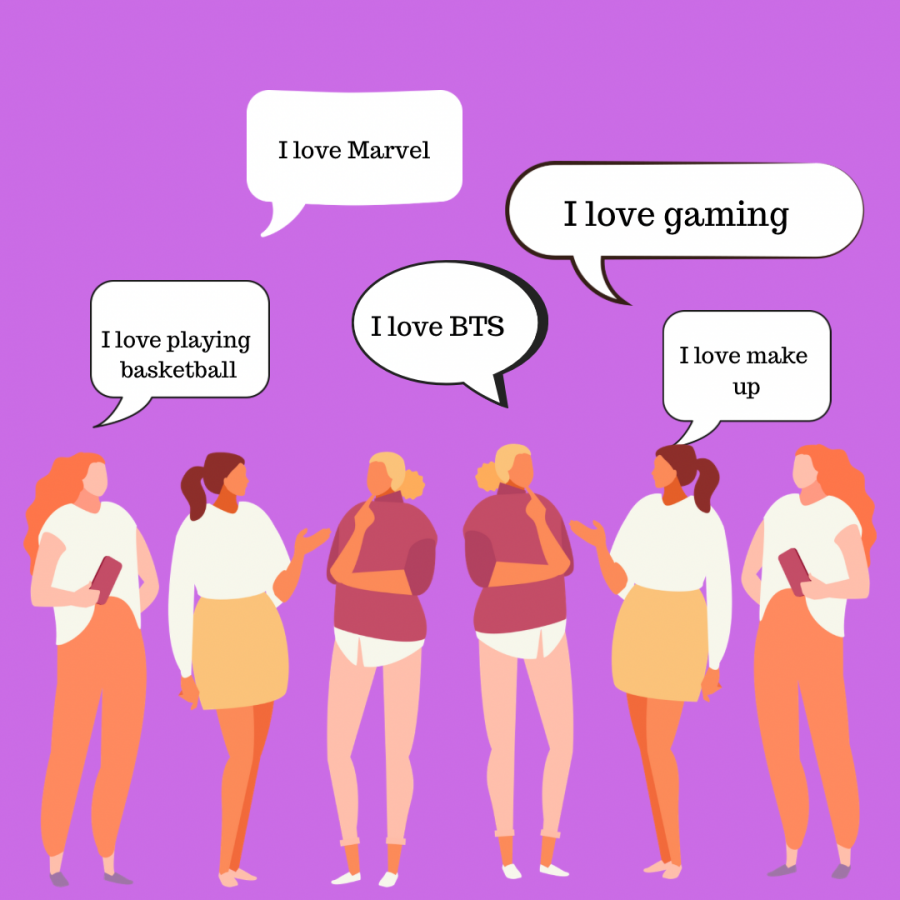The invalidation of teenage girls’ interests must STOP
“That so basic” “ohhh you like this? Name three of…” “I bet you only do that for guys’ attention” are likely phrases most teenage girls have heard before. Teenage girls seem to always get the short end of the stick when it comes to talking about their interest. It’s like no matter what they like they will always be hated or ridiculed for liking something. Whether it is playing a sport or game, liking an artist or show, people can’t seem to let teenage girls catch a break. This isn’t anything new, it’s actually been happening for years. There seems to be a trend of belittling teenage girls for anything they do.
Teenage girls will be called crazy fangirls for liking a boy band or literally any band. When One Direction was at the height of their popularity many fans of the band were called crazy for loving the band. Many went on to make fun of the girls to the point where it was almost embarrassing to talk about their love for the band. This type of treatment is still happening today with fans of the popular K-pop group BTS with their fans being called crazy stans. When really it’s just a group of dedicated fans who love to talk about their interests. Same thing happened with the Beatles when a teenage girl of that time was called crazy and now if a teenage girl even says she likes the Beatles then oh pop quiz “name 5 of there songs.”
This also is something that happens with movies and one of the prime examples is Marvel. If you go on twitter you will see men complaining about how teenage girls only like Avenger movies to see Tom Holland on screen. It’s like the Avenger movies haven’t been some of the most successful movies of all time. Girls are less likely to talk about their love for something that seems like a “boy” thing because they don’t want to be quizzed about everything that Marvel has ever put out. When girls are in male dominated area it can be scary to even put their two cents into the conversation because they won’t be taken seriously.
“People have doubted my knowledge on certain issues because of my gender,” said junior Ozioma Jatto. “Whenever I walk into a room that is filled with men as the majority, I already have something to prove. For example, I was really interested in skating last summer and when I first started a lot of guys would comment on my shoes and how I would skate and I got a lot of hateful comments like “girls can’t skate” or they would call me a “poser” even though I was just starting out.”
Even when girls do like movies that are targeted to teenage girls, people still make fun of them for it. This was very prevalent in the early 2010’s when movies like Twilight, The Fault in Our Stars and The Hunger games were popular with many people saying that the movies sucked because their fandoms were manly girls. Now Twilight had many problems with their movies but the main reason so many people hated the movies was because it was a franchise targeted towards girls.
Jatto went on to explain that between the NBA and the WNBA, WNBA players earn a lot less and people are “ruthless when talking about the women in that league, even though there have been great female basketball players,” while male NBA players get more fame, coverage and as a result, money.
“Even as kids, things are marketed by gender,” she continued “You have boys toys like cars and trucks and you have girls toys, things like dolls. The dolls were seen as lame and boys would make fun of girls for being girly or liking things that society has subconsciously pushed onto them.”
Another area where teenage girls are forced to prove their knowledge and ability is sports. For example if a girl likes a sports team then automatic quiz. Name all the players on the team? When’s the last time they won a championship? It’s the same invalidation that girls have to constantly face and it’s so exhausting. When girls tell someone that they play a sport someone automatically says “I can probably beat you” or “let’s do a one on one to see who’s better.” Just lets girls play a sport without having them prove their abilities.
“I started playing basketball in sixth grade which is to this day considered a ‘boy sport,” said junior Melanie Aguilar. “I wasn’t taken seriously well. My team or any girls team is taken seriously due to the fact that we’re girls. We were told we’re not capable of doing things that the boys are capable of doing, that we would never get into a good college because scouts don’t look into girls only guys.”
When girls get into gaming or play any type of gaming console they get told that they’re only playing for guys attention. This happened on the Tik Tok user Rileyblacked where she showed off a Geforce Rtx 3070 and then was told that she probably looked up best PS 2020 and got that part. Her comments were flooded with misogynistic comments about how she probably only plays Minecraft or that she probably couldn’t play COD, CS-GO or any of the popular games. This led many girls speaking out on how quick it takes for people to try to invalidate a girl’s interest. A lot of women aren’t taken seriously in the gaming community as it is. So imagine how it feels for these young girls to take on an interest and be told by so many people that they’re faking it for attention. It turns girls away from even attempting to play a game from the fear of being ridiculed.
Teenage girls are also made fun of for liking things that are seen as girly things. If a girl likes make up she’s told that she’s fake and to actually take up a “real” hobby. If she likes doing hair or nails she’s told that she is conceited and only cares about her looks. Girls are constantly being told that they can’t like something but boys are quickly accepted whenever they like something. Whether it’s taking up a hobby or simply enjoying an artist they will always get the privilege to just like it and not be questioned. So if girls can’t like “boy” stuff and they can’t like “girl” stuff then what can they like?
“Personally I don’t think there is anything a teenage girl can enjoy without being criticized,” says Jatto. “If a girl does something or acts outside of the “gender norm” than society looks down on her, but if she conforms to the societal expectation of a woman then people will find something wrong with it, calling her things like “old-fashioned” or “out of date.”
Your donation will support the student journalists of Parkdale High School. Your contribution will allow us to cover our annual website hosting costs and publish some printed editions, as well.

Guadalupe Vidal is in her second year of journalism and is junior soon to be a senior. She joined journalism after thinking of pursuing journalism as a...







